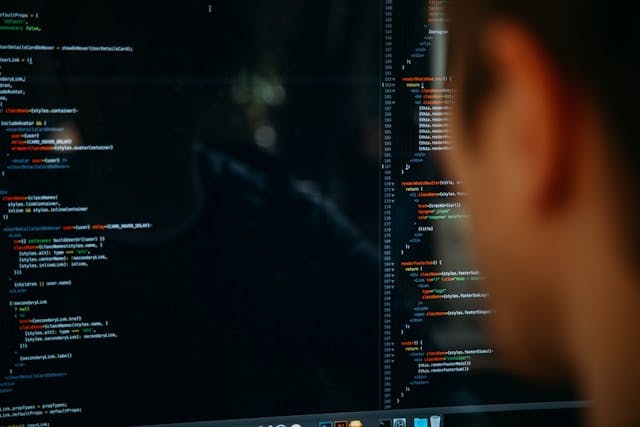
Photo by Thought Catalog on Unsplash
What Will Happen If You Code Everyday For 1 Hour
Benefits of Coding Daily for an Absolute Beginner to Programming
Café of Inspiration: More Than Just Coffee
On a beautiful Wednesday afternoon, I left the house earlier than usual to pick up the children from school. I planned to stop by the library to get at least two hours of work done. However, after stepping onto the bus, I realized I'd left my bus card at home. So, I had to return home, retrieve it, and walk another 12 minutes to catch the next bus.
After an eight-minute wait at the bus station, I finally boarded the bus, only to discover upon arrival that the library was closed. Feeling frustrated and unsure of how to salvage the two hours, I decided to turn this disappointment into an opportunity.

I found a charming café nearby and settled in with a cup of coffee. The soft instrumental music playing in the background, the hanging flowers, the furniture, and the beautiful wallpaper all combined to create an inspiring ambiance. As I gazed through the café's beautiful front glazing, I was reminded that I'm not just a coder, but a writer as well. The café staff were friendly, and the manager even allowed me to take pictures.
Sitting in that café, ideas began to flow and I decided to work on a new, exciting concept.
Enriched by this experience, I then put pen to paper as I recanted the 10 things that have happened to me since I started coding.
I started to ponder the notion of coding every day for an hour. How would that impact you, not just as a coder, but as an individual?
Steve Jobs once said:
"Everybody in this country should learn how to program a computer... because it teaches you how to think." -Steve Jobs
Truthfully, the urge to give up may surface early on, particularly as you face tough problems that need debugging or start to experience the weight of information overload. However, the secret lies in persevering. In a subsequent post, I'll reveal various strategies I employed to make sure I didn't throw in the towel.
10 Things That Will Happen Once You Start Coding Daily
BUILDING CHARACTER

Consistent coding, based on a regimen and routine, not only instils discipline, perseverance, and a growth mindset but also boosts personal effectiveness. It encourages a structured approach to problem-solving and achieving goals in daily life.
- The early riser ...
For a significant part of my life, I struggled to wake up early or in the middle of the night if needed. As a result, I decided to shift towards being a night owl, working late instead of sleeping early and waking up early. Today, even if I go to bed late, the mere thought of myself coding at my computer table motivates me to get out of bed early. I find this transformation amazing as I've realized that I am fresher and sharper in the early hours of the morning.
TRANSFORMING YOUR BRAIN

Isn't it fascinating how our brains can adapt to pretty much anything? It's like it is always ready for a challenge. Whenever you learn something new, it is not because your brain got any smarter, but because the brain is plastic in function as it responds to whatever demand is placed upon it. When we're faced with something as intimidating as learning to code, it's like our brain muscles start flexing in ways we didn't know they could. It's tough at first, sure. But the one thing I've learned since I started coding is that feeling overwhelmed is just a part of the process. It doesn't mean you should give up. On the contrary, it's your brain gearing up, getting ready to level up its game.
- Mixing up Names ...
Speaking of brain quirks, let me share a little story about my family. I have three amazing sons. For the longest time, my middle one was the youngest, and somehow, that idea got stuck in my brain. I found myself mixing up their names, a mix-up that was funny at first but then started happening more often than I'd like to admit. And it wasn't just names. I'd pick up my phone to do something and instantly forget what I wanted to do on my phone, the moment the screen lit up. But here's the kicker: I can't remember the last time I got their names wrong or stared blankly at my phone screen. It's as if diving into programming has done some sort of magic trick on my memory.
ALLEVIATING DEPRESSIVE SYMPTOMS

Learning programming not only equips you with a valuable skill set but also serves as a potent tool in combating depressive symptoms through various mechanisms. At its core, coding requires problem-solving, logical thinking, and creativity, engaging the brain in ways that can significantly shift mental patterns and moods.
- Progression and Accomplishment ...
Firstly, programming offers a clear sense of progression and accomplishment. As you learn to write code and see your projects come to life, it naturally boosts your self-esteem and confidence. Each bug fixed or feature implemented acts as a tangible measure of your growth, directly countering feelings of inadequacy or self-doubt that often accompany depression.
- Distraction from Negative Thought ...
Moreover, coding demands focus and concentration, drawing your attention away from negative thought cycles. This immersive experience acts as a form of mindfulness, where the act of coding becomes a meditation in itself. By engaging deeply with the logic and structure of code, you momentarily step away from stressors, providing mental relief and fostering a sense of peace.
- The Social Aspect ...
The social aspect of coding cannot be understated. The tech community is vast and welcoming, offering endless opportunities for collaboration and connection. Whether through online forums, coding boot camps, or local meetups, interacting with fellow coders can alleviate feelings of isolation by building a support network of individuals who share similar interests and challenges.
- The Growth Mindset ...
Furthermore, the act of learning and mastering a new skill like programming can significantly impact your mental health by fostering a growth mindset. This outlook encourages resilience, adaptability, and a positive perspective on challenges as opportunities for development. Embracing this mindset can reduce feelings of helplessness and promote a proactive approach to life and its obstacles.
- Self-Expression ...
Lastly, the potential for creativity in programming provides a unique outlet for self-expression. By building projects or solving problems in new ways, you can channel your emotions and ideas into something constructive, offering both a sense of purpose and an escape from negative thoughts.
FOSTERING A LOVE FOR CODING

You know, there's something magical about getting into coding. At first, it's like trying to navigate a maze in the dark. You're not sure where you're going, and every step feels uncertain. But then, something clicks. You solve a problem here, create a little function there, and suddenly, you're not just making progress; you're actually having fun. That feeling of getting something right, it's like a little victory party in your brain. Before you know it, an hour of coding just isn't enough anymore. You're hooked, and you can't wait to see what you can build next.
- Coding Delight ...
I'll be honest, when I first started coding, the mere thought of opening my Integrated Development Environment (IDE) filled me with dread. It seemed so dull and intimidating, like a blank canvas that I didn't know how to fill. But now? It's a whole different story. I can't believe I'm saying this, but I actually love coding. I look forward to tackling new challenges and bringing my ideas to life. It's turned from a nightmare into a dream I don't want to wake up from.
The journey from coding dread to delight has been unexpected, to say the least. It's all about those little moments of understanding that slowly build up, transforming how you see coding. And let me tell you, once you start enjoying it, there's no going back. It's not just about writing code; it's about creating something out of nothing, and there's a real joy in that.
ENCOURAGING PACED LEARNING

The principle of paced learning, especially in the context of acquiring programming skills, plays a crucial role in optimizing knowledge acquisition and retention. By dedicating a manageable one hour each day to focused learning, individuals can avoid overwhelming themselves with unattainable goals and prevent the common pitfall of information overload. This methodical approach allows the brain sufficient time to rest, process, and integrate new information, which is essential for solidifying learning and strengthening the neural connections associated with programming knowledge and skills.
- Manage Burnout ...
Burnout is a significant risk in the journey of learning programming due to the vast amount of information and the constant evolution of technologies. The desire to quickly master multiple languages, frameworks, and tools can lead to excessive stress and mental fatigue, undermining both learning efficiency and personal well-being. Pacing your learning effectively mitigates this risk by promoting a balanced approach, where consistent, incremental progress is prioritized over sporadic bursts of intense study.
- Fun While Learning
Furthermore, paced learning fosters a sustainable and enjoyable learning journey. It cultivates a sense of accomplishment and progress by setting realistic learning targets and achieving them regularly. This not only enhances motivation but also builds a positive feedback loop, where each success fuels the desire to learn more.
Additionally, focused-paced learning ensures continuous improvement. By committing to learn something new every day, individuals can steadily expand their knowledge base and skill set. This approach aligns with the concept of lifelong learning and adapts well to the dynamic nature of the tech industry, where staying updated with the latest developments is crucial for success.
PROBLEM-SOLVING SKILLS

Spending long minutes, or even hours, staring and debugging a broken code is a hallmark of the programming journey, a sentiment I deeply relate to. My approach to tackling issues doesn't involve immediately jumping to seeking quick fixes or solutions; instead, I prefer to delve into the problem, attempting to unravel it on my own. It's only when the challenge starts to significantly encroach upon my time that I resort to seeking external help. Frustratingly, more often than not, the culprit behind the error is something as trivial as a missed syntax or an unnecessary addition. The resolution, though simple, underscores the meticulous nature of coding.
- Under The Hood
As my days unfold, I'm constantly encountering various workflows, applications, and interfaces, prompting me to think about the underlying code and its potential for improvement. For example, at my current workplace, we use a scanner for organizing product pickups in a specific sequence. Observing the user interface, I couldn't help but envision enhancements that could streamline its efficiency—like an adjacent summary of items to be picked, dynamically updating to reflect progress by removing scanned items, thereby offering a real-time tally of completed tasks.
- Code at Home-Life ...
This journey has also sharpened my strategic and analytical skills beyond professional scenarios, extending into my personal life. I often find myself imagining the creation of apps designed to address daily challenges faced at home, turning each obstacle into an opportunity for innovation. The process of envisioning, diagnosing, and conceiving solutions has not only honed my technical abilities but has also nurtured a mindset oriented towards constant improvement and problem-solving, whether in the context of work or home life.
BECOMING A MORE PROFICIENT PROGRAMMER

Indeed, the mantra "practice makes perfect" holds profound truth, especially in the realm of coding. Repetition not only cements learned concepts but also equips one with the resilience to tackle challenges creatively. This iterative process of confronting obstacles enhances cognitive flexibility, teaching programmers to navigate problems with increased skill and innovation. My journey in coding is a testament to this principle. With each consecutive day of disciplined practice, my approach to coding challenges evolved dramatically. The transition from initial frustration to strategic thinking was not abrupt but a gradual shift, marking a significant transformation in my problem-solving methodology.
- Pseudo-Coding
Learning to use pseudo-code, a technique I once overlooked, became pivotal in my development. It taught me to dissect complex problems into manageable chunks, simplifying what once seemed insurmountable. This skill has been instrumental in refining my thought process, enabling me to approach coding tasks with clarity and precision.
As of now, while I'm not yet a senior programmer, the consistent daily practice has propelled me past the novice stage. I find myself navigating the terrain between a junior and an intermediate programmer with confidence. This journey underscores the immense value of persistence and the transformative power of daily, focused practice in coding.
SECURING YOUR DREAM JOB

Landing your dream job in the tech industry can become a tangible reality through the consistent practice of coding for one hour every day. This disciplined approach not only sharpens your programming skills but also significantly broadens your understanding of complex concepts and technologies, making you a more competitive candidate in the job market. Every hour spent coding accumulates into a vast reservoir of knowledge and experience, enabling you to tackle technical interviews with confidence and showcase a diverse portfolio of projects.
- Continuous Learning
Daily coding practice instills a habit of lifelong learning and adaptability, traits highly valued in the rapidly evolving tech landscape. By staying current with the latest technologies and programming methodologies, you demonstrate to potential employers your commitment to professional growth and your passion for technology. Furthermore, the problem-solving skills honed through regular coding sessions are applicable across a range of roles and industries, underscoring your versatility as a candidate.
- Enhance your Resume
Engaging with coding projects daily also offers the opportunity to contribute to open-source projects or develop your own software applications. Such initiatives can significantly enhance your resume, providing tangible evidence of your skills, initiative, and ability to collaborate on complex projects. Ultimately, the discipline of coding for one hour each day not only prepares you for the technical demands of your dream job but also cultivates the soft skills and innovative mindset that set you apart as a candidate.
EARNING A HIGHER INCOME

Earning a higher income is a significant benefit of honing your programming skills through daily practice. The field of programming offers some of the most competitive salaries in the job market, reflecting the high demand for skilled developers across various industries. According to the U.S. Bureau of Labor Statistics, the median annual wage for software developers, quality assurance analysts, and testers was approximately $110,140 in May 2020, with employment in these fields projected to grow 22% from 2020 to 2030, much faster than the average for all occupations.
- Six-Figure Specialist Professionals
Dedicating an hour each day to coding not only enhances your proficiency in current technologies but also enables you to explore emerging areas such as artificial intelligence, machine learning, and blockchain. Specialists in these high-demand fields can command even higher salaries, with experienced professionals in niche programming areas earning well into six figures annually. For instance, Glassdoor reports that machine learning engineers and data scientists often have median base salaries ranging from $120,000 to $150,000, depending on experience and location.
- Freelance
Furthermore, consistent coding practice opens up freelance and consulting opportunities, which allow for higher income potential based on the ability to take on multiple clients or projects. Freelance developers with strong portfolios and specialized skills can set competitive rates for their services, significantly boosting their earning potential.
EXPLORING A VAST WORLD OF SPECIALIZATIONS

Diving into the realm of programming opens up a vast world of specializations, each offering unique challenges and opportunities. This diversity allows programmers to tailor their career paths according to their interests, strengths, and the market demand, significantly enhancing job satisfaction and income potential. Here are a few key areas of specialization within programming:
Web Development: Focuses on building websites and web applications. Specializations within web development include front-end (client-side), back-end (server-side), and full-stack (both front-end and back-end).
Mobile Application Development: Involves creating software for mobile devices, with a focus on platforms like Android and iOS. Developers in this area must understand the nuances of mobile UI/UX design and the specific development tools and languages for each platform.
Data Science and Machine Learning: Data scientists analyse and interpret complex data to help companies make decisions. Machine learning engineers build algorithms and predictive models that allow computers to perform tasks without being explicitly programmed for each.
Cybersecurity: Cybersecurity experts protect systems, networks, and programs from digital attacks. This specialization requires a deep understanding of vulnerabilities, threat mitigation techniques, and compliance regulations.
Game Development: Game developers create video games for consoles, PCs, and mobile devices. This field combines programming with creative design to bring interactive experiences to life.
Cloud Computing: Specialists in cloud computing develop and manage cloud-based applications and services. Knowledge of platforms like AWS, Microsoft Azure, and Google Cloud is crucial.
Blockchain: Blockchain developers work on decentralized applications and systems, primarily focusing on cryptocurrencies, smart contracts, and distributed ledger technologies.
DevOps: DevOps practitioners aim to shorten the development lifecycle by adopting a set of practices that integrate development (Dev) and IT operations (Ops), emphasizing automation, collaboration, and continuous delivery.
CONCLUSION
Learning to code can indeed present significant challenges, including navigating complex syntax and absorbing the vast amount of information required. Moreover, the constant updates and new technologies in the field add to the complexity. Such challenges may lead to a sense of overwhelm, fostering a temptation to give up. This reaction, however, stems from the brain's adaptation process as it learns to approach problems in novel ways—essentially, it's rewiring itself. Perseverance in this phase is crucial, and the results of consistent coding practice can be profoundly rewarding. In my upcoming post, I'll share effective, efficient strategies that have supported my learning journey.
To gain early access to these insights, I invite you to subscribe to my newsletter and also add a comment about your own experiences in coding. Stay tuned, and thank you for your support.
Click here to begin the Front End Web Development Series.
Best, Oloche

